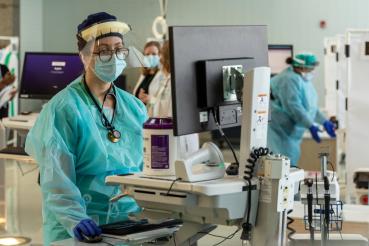With the emergence of a new disease like COVID-19, we have had to learn and adapt quickly. And we certainly have adapted quickly.
Since COVID first emerged in the U.S., we have made remarkable progress in how we treat this novel virus. The speed and effectiveness with which we have managed to improve mortality for people who have COVID-19 is impressive. We’ve incorporated therapies like steroids and blood thinners, which have both had a positive effect on COVID patients. Additionally, novel therapies like monoclonal antibodies are also producing promising outcomes in some patients.
However, what is both surprising and highly unpredictable is determining who will have long-lasting effects from COVID-19 and what types of symptoms they will continue to have long after they’ve recovered from it. Right now, that is a key question we are asking ourselves as health care professionals.
Symptoms after COVID
What we do know is that a fair number of these patients might have symptoms for several months after their initial diagnosis. These patients are often referred to as “COVID long haulers.”
Some of the most common long-term effects patients are experiencing include shortness of breath, abnormal blood sugar, physical limitations, blood clotting disorders, fatigue and cognitive changes.
The catch is that these aftereffects are not limited to those who had a severe case of COVID. Even patients who have had somewhat minor bouts with COVID may continue to experience generalized fatigue, brain fog and other issues. In fact, studies have found that 30% to 40% of people who have had COVID are experiencing some type of neurological side effects like brain fog, memory problems and continued loss of smell.
As health care providers we have a responsibility to try to help these patients get back to health, particularly since COVID disproportionately impacts communities in which health care disparities exist — and Rush has a stated mission to serve. I also see this also as an important opportunity to study the long-term impact that COVID has on our health overall.
Leading the way
As Rush continued to garner national recognition for successfully caring for COVID patients throughout the pandemic, I recognized an opportunity for us to be leaders in addressing the long-term effects of COVID.
It is increasingly clear that hospitals with large, diverse patient populations like ours are seeing similar aftereffects of COVID: patients struggling with different ailments affecting several organ systems.
Addressing these aftereffects requires coordinated care between several specialties. That type of coordination and multidisciplinary approach has been at the heart of patient care at Rush long before COVID. It is then only natural for us to take that same approach to our patients who are facing the unnerving, often complicated aftereffects of COVID.
A transitional care clinic
Working with my colleagues, I devised a plan for our transitional post-COVID care clinic to help coordinate patients’ care. The clinic helps connect patients to the specialists they need to get back on the right track.
We built the clinic as a “one-stop shop” where our patients could get the care they need at every level.
The clinic is currently available to patients who have had COVID-19 and continue to struggle with one or more aftereffects.
Medication management is one of the most complex, yet important, aspects of post-COVID care. That’s why we have a dedicated pharmacist in our clinic who evaluates each patient’s medications. Often, these patients are taking several medications — both for COVID symptoms and pre-existing conditions, and many may require adjustment after discharge.
We also have an onsite bilingual social worker who meets with patients to get a comprehensive view of their physical, social and emotional needs, and then connects them to the resources they need.
Of course, we also have a wide range of subspecialists, including providers from cardiology, neuropsychiatry, endocrinology, pulmonology, hematology, nephrology and more. With a multidisciplinary team of experts working together, we’re able to coordinate and address every aspect of our patients’ care needs.
Finding answers and making progress
Current estimates suggest that 10% to 25% of patients develop lingering symptoms of COVID long after viral testing has become negative. Work at Rush has been focused on translational aspects of COVID, such as biomarker-guided prediction of infection severity, as well as clinical studies on managing the disease with innovative medical approaches.
There is no test or biomarker at present that can predict who is likely to have long-term effects from COVID. Yet, one of the most exciting aspects of this clinic is the opportunity to combine clinical care with translational research studies, collect biospecimens and measure activities and causes of inflammation, and discover potential genetic modifiers. Ultimately, we aim to get a better understanding of individual patients at risk so we can better identify them early and, ultimately, prevent long-term effects of COVID.
Another point we’re interested in investigating is how these aftereffects of COVID will affect patients’ long-term, overall health, particularly considering the importance of social determinants of health in vulnerable patient populations. We’d like to identify patients in this clinic to follow longitudinally and to be touchpoints for future studies where the science can actually be borne out to help us identify predictors of who gets this disease, who doesn’t and what the long-term impact is.
For patients, this is an opportunity to contribute to science. They will be playing an important role in advancing treatment and discovering everything we can about this novel virus. What we learn will help our patients, along with people throughout the Chicago area, Illinois and the nation.
A new era of collaboration
We’ve never faced anything like COVID in my lifetime. Certainly, diseases like measles, mumps and chickenpox had aftereffects like hearing loss and infertility. But there was a better understanding of the pathogenesis of those viruses — and they never reared themselves up to a pandemic level like this.
Clearly, this is new territory, and while that has been scary and challenging, the way our field has responded is extraordinary. We have experts working all over the world to find answers, treatments and solutions — and we’re all sharing that information and data with each other. It has truly ushered in a new era of collaboration and information sharing across the world, which does not always happen in a competitive field like medicine.
Personally, I am inspired by it, and I am hopeful that our work in the post-COVID clinic will help contribute to further progress.




